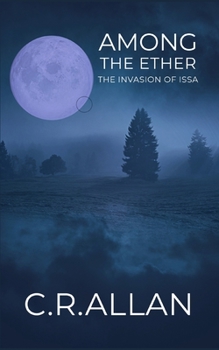Among The Ether: The Invasion Issa
Select Format
Select Condition 
Book Overview
Journey through the ether with Jacob as he navigates his changing world. Jacob's home planet Issa is invaded by a power-hungry organization, known as the Inter-planetary Trading company. The Company vessel, Avus, orbiting around, Jacobs planet Issa, is commanded by President Ettimis. A cynical tyrant who wishes nothing more than to extract resources from around the galaxy to advance his position in the Trading Company and will attempt to achieve his goals at any cost. With Issa defenseless against the invasion, and the Galactic Union unable to help; Jacob watches as it destroys his town, and his life's turned upside down. Through a series of hardships and trials, Jacob must make new friends as he learns to survive in an ever-changing environment. Through fighting to stay one step ahead and evade the Trading Company, Jacob unknowingly begins his Journey to head out among the Ether. Among the Ether, Invasion of Issa is book one in the Among the Ether series. The series takes place in a fictional universe in which humans left a planet like earth to explore the galaxy many millennia ago. Finding very little life elsewhere that they could interact with; they used their advanced technology to sterilize and seed countless star systems throughout the galaxy, ensuring only life from their own planet existed among the stars. After accomplishing their goal, they then disappeared, leaving the seed worlds to grow and advance unhindered. The people on the seeded worlds throughout the galaxy evolved at different rates and now sit at varying stages of advancement. And those civilizations that have been around the longest remember the ancient humans, known as the architects, only through their myths and legends. Civilizations who advanced at a slower rate became at risk of being invaded and destroyed by more advanced civilizations. The Inter-planetary trading company is a corporation composed of such advanced civilizations, whose only motivation is resources, profits and conquest. The company unchecked would already be in complete control of the galaxy had the planets that founded it been the first to advance. The first advance societies where peaceful and still carried some knowledge of the architects. These civilizations established the Galactic Union, which comprises thousands of star systems and establishes the set standard of law throughout the galaxy. At the heart of the union is the Council of Judicatures which ensure the rule of the galaxy is maintained, through force if necessary. Outside of these two organizations are many words that are have not discovered or choose to live outside their boundaries and outside their rule of their law. This science fiction series incorporates aspects of fantasy with magic use and space travel while using steampunk elements as the primary form of technology. This is Just book one of many to come in this rich universe. Many adventures and stories await both through the characters in this book and beyond.
Format:Paperback
Language:English
ISBN:B08HG7TQ31
ISBN13:9798682311668
Release Date:August 2020
Publisher:Independently Published
Length:106 Pages
Weight:0.27 lbs.
Dimensions:0.3" x 5.0" x 8.0"
Customer Reviews
0 customer rating | 0 review
There are currently no reviews. Be the first to review this work.





















